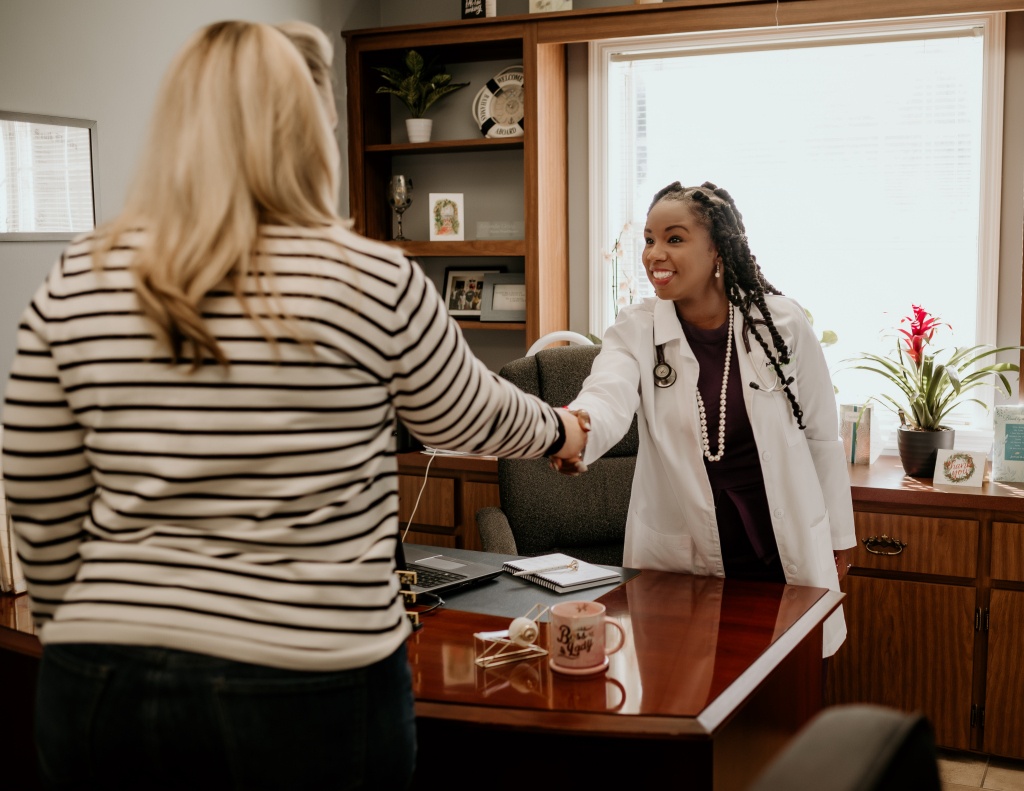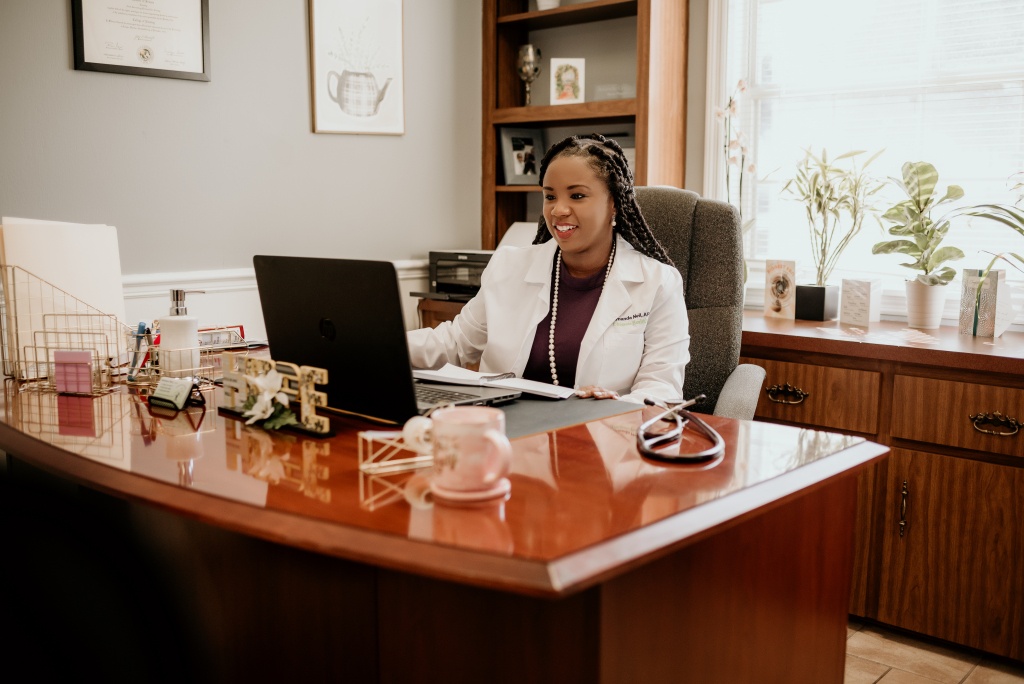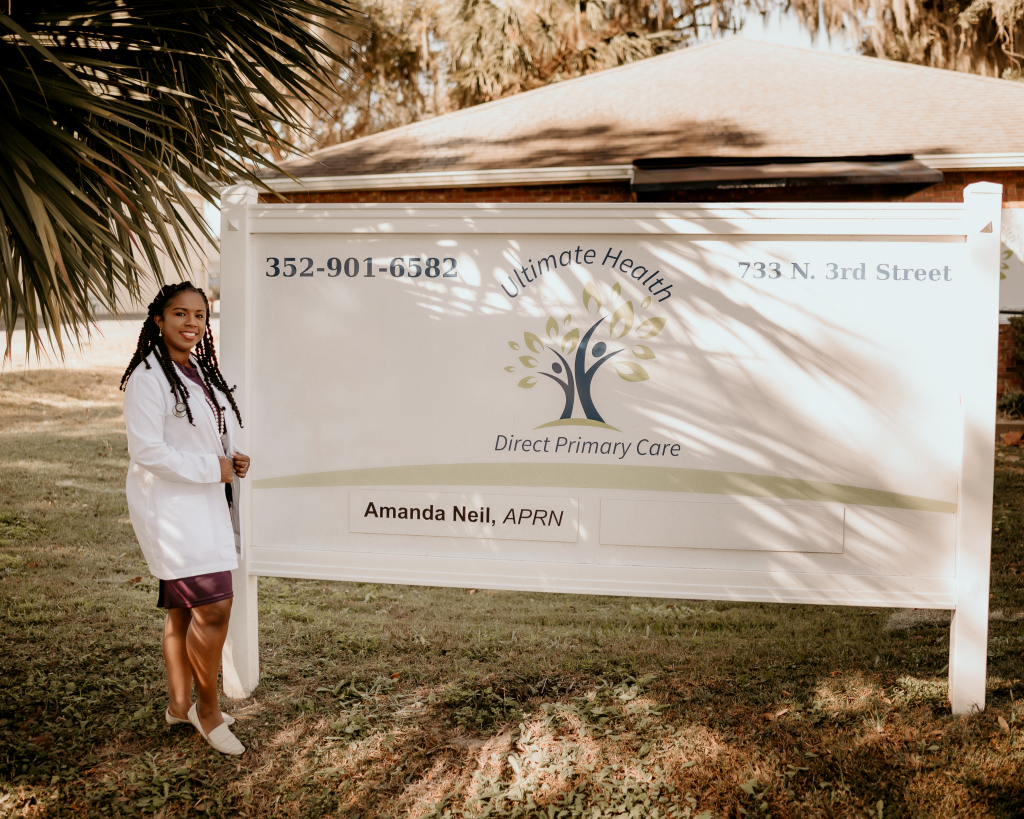A Nurse Practitioner Who Doesn’t Have to Say ‘No’ to Her Patients

The hours of operation for nurse practitioner Amanda Neil’s new business, Ultimate Health Direct Primary Care, might sound too good to be true: 24 hours a day, Monday through Saturday. As if to test that promise, a patient sent Neil a flurry of urgent text messages at 11 p.m. on a recent Saturday.
Christmas, to be exact.
Neil didn’t hesitate to help. After an extensive back-and-forth, “she sends me ridiculous blood pressure readings,” recalls Neil, who phoned her patient to say, “Listen, honey. I’m so sorry, but I need you to go to the ER to make sure you’re not having a stroke.” Come 2 a.m., it was Neil texting her patient, eager for updates. Thankfully, the ER visit revealed her patient was only suffering from anxiety.
Soon after, Neil blocked off a full hour for a follow-up virtual visit. “I just listened,” Neil says.
It must be overwhelming to allow patients to text and call at all hours, right? No, it turns out.
“People just want to be heard,” explains Neil, who radiates poise and enthusiasm — surely invaluable traits as the only NP at her independent practice in Leesburg, Florida, which signed up an impressive 100 patients by December, barely three months after opening.
Those patients — many of whom previously might have had limited access to healthcare — can be eager at first to discuss what’s ailing them. But Neil says the Christmas night crisis highlights what happens when patients have a provider who’s fully invested in their well-being. “I haven’t gotten any text messages from her since.”

An Early Calling
Growing up in the Central Florida city of Winter Haven, Neil decided she wanted to be a pediatrician when she was 8 years old. The only physician she knew at the time was Dr. Cliff Huxtable of TV fame.
“I grew up in extreme poverty,” she says. “We didn’t go to the doctor. I never had a pediatrician in my life, but I knew I wanted to be one.”
In high school, Neil shadowed a nurse at the local health department. She noticed that doctors seemed to have hurried conversations with patients, whereas nurses enjoyed more meaningful interactions. She remembers thinking, “I’m too nosy for that ‘Yes doc, no doc,’ stuff. I want all the tea” — in other words, all the details nurses were responsible for collecting.
When she told her father of her revised aspirations, he went ballistic, yelling, “Who goes from wanting to be a doctor to being a nurse?” Neil’s journey in medicine would go on to demonstrate just how misguided it is to underestimate nursing. (These days, Neil says, when her credentials come up, “my dad sticks his chest out like a peacock.”)
After graduating from Florida A&M, the historically Black university, Neil started her career at the community hospital where she was born. About six years of working nights meant Neil rarely had time with her son, so she obtained a master’s degree in nursing from the University of South Florida.
“I knew I did not want to work in some bougie med spa,” Neil says. She returned briefly to the night shift and then transitioned to a leadership role supervising nursing staff at a community health center in Winter Haven. She gained experience in end-of-life care and a deep respect for mental health services, but the grant-dependent health center was forced to prioritize volume at the expense of quality. “When you’re on that rat wheel, I can’t address everything,” Neil says.
In 2016, she relocated to Leesburg, working at a clinic specializing in severe mental illness and substance abuse disorders. In March 2020, as the COVID-19 pandemic was just beginning to upend the U.S. healthcare system, Florida’s governor signed a law allowing nurse practitioners with at least 3,000 hours of experience working under a physician to independently operate primary care practices without an attending doctor.
The bill was signed a day before Neil’s birthday. She remembers thinking, “It’s a gift for me.”
Discovering DPC
Neil dreamed of starting her own practice, and direct primary care “screamed my name.” She wanted a model that was financially accessible to patients and allowed them to have all their needs addressed during a visit, rather than pushing them out the door and insisting they schedule another appointment.
She relished the chance to ask patients a simple question: “Anything else?”

Still, starting a practice wasn’t easy for someone without much money or business experience. Neil depended on step-by-step guidance from the Small Business Development Center at the University of Central Florida. A consultant helped Neil acquire a loan to buy her building and get the practice up and running by August 2021.
Neil wasn’t intimidated by the prospect of launching a business in the middle of a pandemic. “I don’t run away because you’re sick. This is healthcare — I run into the burning building.”
She remembers the “disgusting” experience of being homebound with COVID and sending her 17-year-old son to pick up her prescription, only to be turned away because he’s a minor.
In her practice, “You’ve got COVID? I’ll come to your house. You’re going to get your drip, and you’re going to feel better.”
She has some advice for physicians or NPs thinking of starting their own DPC practice:
- Be smart about advertising. “I spent a bunch of money that everyone told me not to.” Billboards and ads on TV and radio were status symbols that didn’t attract many patients. Ultimately, word of mouth and inexpensive yard signs have proved most effective because they demonstrate that patients trust Neil.
- Get the right EHR. Neil says Elation Health spares her wasted time clicking through endless forms. For DPC, she says, “A smooth EHR is priceless.”
- Avoid premature overhead. Neil regrets rushing to buy expensive laser services for erectile dysfunction and vaginal rejuvenation. It would have been smarter, she says in hindsight, to establish patient demand first.
Living Her Dreams
Neil has it all mapped out: a goal of 500 patients for the Leesburg practice, and several more Ultimate Health practices, including in her hometown of Winter Haven, by 2025.
At Ultimate Health’s opening, someone gave Neil a card that said, “You’re Black history in the making.” Neil savors that sentiment, and there’s no doubt she’s already made a profound difference in her community.
She describes one patient who is gender non-binary and hadn’t seen a doctor in 15 years. “They Googled somewhere that was safe and found us,” Neil says. “They came in anxious, afraid I was going to judge. Now I think they consider me a friend. They text me all the time.”






